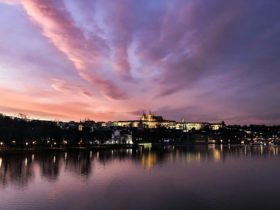The Transport Committee of Prague’s City Council is contemplating a legislative initiative that would enable a ban on traffic blockades on major roads within the capital city. Martin Sedeke (ODS), the committee’s chairman and Prague representative, confirmed this consideration. However, any proposed legislation would need to undergo an assessment by the Prague City Council, followed by further scrutiny from the Chamber of Deputies.
Sedeke stated, “The city’s leadership is exploring all possible avenues to prevent Prague residents from being held hostage by a small group of activists advocating for a proposal that could plunge the city’s traffic into chaos.”
The Prague City Council’s Transport Committee will evaluate the proposed legislative initiative on Tuesday, aiming to prohibit road blockades on major roads classified as first-class roads. Based on the committee’s recommendations, the city’s administration may commission a legal analysis to determine such legislation’s feasibility and specific provisions. If approved by the council, the proposal would be presented for discussion and forwarded to the Chamber of Deputies.
Sedeke added, “As evident from this process, it is not a straightforward procedure, and it could take several months.”
This potential legislative measure is one approach being considered to address the activities of the Last Generation group, which has persistently blocked significant traffic arteries in Prague. The group advocates for a city-wide speed limit of 30 km/h.
In a previous interview with Novinky, attorney Tomáš Sokol discussed alternative options, suggesting that “relevant administrative authorities should defer to the courts for decisions” and emphasizing the need for these authorities to be more assertive.
The spokesperson for the Prague City Council reiterated that the council’s position remains unchanged. Given that the proposed initiative from the Transport Committee must go through the entire legislative process, the city’s standpoint remains the same.
“While traffic restrictions might be theoretically considered to limit gatherings that block a specific area for an extended period (depending on the circumstances, but certainly longer than a few hours) and hinder citizens’ access to their homes, workplaces and other necessities that cannot be fulfilled by alternative means such as walking,” explained Vít Hofman, the spokesperson for the City Council.
The Last Generation group has the freedom to organize a series of processions throughout Prague. Some events are scheduled for May, with further gatherings planned for June.





